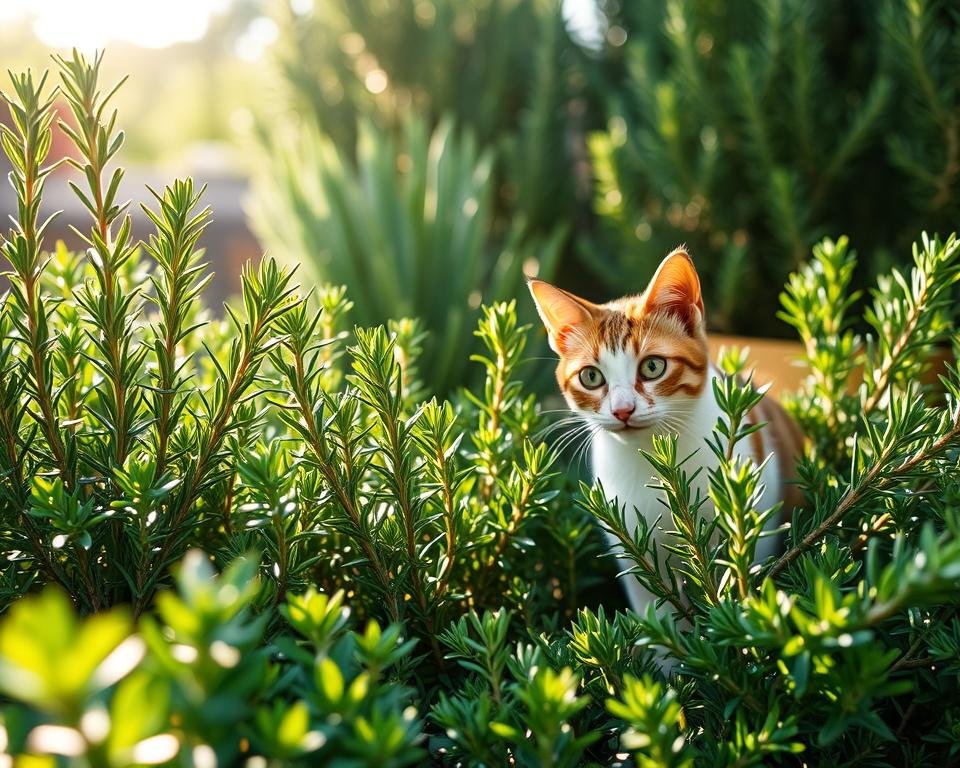Rosemary (Rosmarinus officinalis) is a versatile herb used in many homes. But is it safe for our cats? As pet owners, knowing the benefits and risks of rosemary is key. This guide will help you understand if rosemary is good for your furry friends.
Rosemary belongs to the Lamiaceae family, like catnip. The American Society for the Prevention of Cruelty to Animals (ASPCA) says rosemary is safe for cats. But, it’s important to know how to safely use it with your cat and watch for any side effects.
This guide will help you understand the safety, benefits, and risks of rosemary for cats. It aims to help pet parents make smart choices. This way, you can give your cat a safe and happy home.
Understanding Rosemary and Its Properties
Rosemary is a versatile herb used in cooking, medicine, and for its scent. It’s known for its unique taste and health benefits. Let’s explore its chemical makeup, uses, and forms to understand its impact on cats.
Chemical Composition of Rosemary
Rosemary has volatile oils like camphor and linalool. These oils give it a strong smell and health benefits. They make rosemary a great natural remedy.
Common Uses in Households
Rosemary adds flavor to many dishes. It’s also used in aromatherapy for its calming and stimulating effects. Plus, it keeps insects away with its strong scent.
Forms of Rosemary Available
Rosemary comes in fresh herbs, dried leaves, and rosemary essential oil. While fresh rosemary is safe for cats, essential oil can be dangerous. Be careful when using rosemary around cats.
“Rosemary is a non-toxic herb for cats, and small amounts are not considered dangerous for felines.”
Knowing about rosemary’s properties and forms is key for pet owners. It helps keep their cats safe and healthy.

Is Rosemary Safe for Cats
Rosemary (Rosmarinus officinalis) is not poisonous to cats, but caution is needed. Cats can’t digest plants well, so even safe herbs should be treats, not main meals.
Unlike some herbs, like oregano and mint, rosemary is usually okay for cats in small amounts. Watch your cat closely when they try new foods, like rosemary. Stop giving it if they show signs of sickness, like throwing up or feeling tired.
For those wanting to add safe herbs to their homes, the ASPCA suggests basil, cilantro, dill, sage, and thyme. Always talk to your vet before changing your cat’s diet or home.
“While rosemary is not poisonous to cats, it should only be offered as an occasional treat, not as a primary part of their diet.”

Knowing the risks and benefits of herbs like rosemary helps keep cats healthy and happy. Always introduce new foods slowly and watch how your cat reacts.
Benefits and Uses of Rosemary for Cats
Rosemary is generally safe for cats, but its health benefits are not well-studied. Its antioxidant and anti-inflammatory properties might help our feline friends. Rosemary is listed as non-toxic for cats by the ASPCA animal poison, making it a safe addition to their diet or environment.
Antioxidant Properties
Rosemary has compounds like rosmarinic acid and carnosic acid that are antioxidants. These antioxidants can help fight free radicals and support cell health in cats. While more research is needed, rosemary’s antioxidants might improve immune function and reduce inflammation in cats.
Anti-inflammatory Effects
Rosemary’s anti-inflammatory properties could also benefit cats. Rosemary contains volatile oils that can have soothing effects on the body. These compounds may help reduce inflammation and discomfort in cats, such as arthritis or skin irritation.
Nutritional Value
Rosemary is rich in vitamins and minerals, including vitamins A, C, B6, folate, calcium, iron, and magnesium. While there’s no clear evidence of its health benefits for cats, its nutritional profile suggests it could support their overall wellness when eaten in moderation.
Rosemary can also enrich a cat’s life by allowing them to sniff and chew. This is great for indoor cats who might not have enough to do.

“Rosemary is not toxic for cats according to the ASPCA, but it can upset a cat’s stomach if consumed in sufficient quantities.”
Potential Risks and Side Effects
Rosemary is usually safe for cats, but too much can upset their stomach. Cats might vomit or have diarrhea because of rosemary’s oils. These problems are usually mild and go away by themselves.
If these issues last more than a day, it’s wise to see a vet. It’s important to know the difference between rosemary herb and essential oil. Essential oil can be dangerous for cats, causing skin issues, heart rate drops, or even seizures.
- Rosemary is listed as non-toxic to cats by the ASPCA, dogs, and horses.
- Cats lack the liver enzyme necessary for breaking down and eliminating substances like essential oils.
- Exposure to rosemary essential oil can lead to symptoms such as drooling, vomiting, lethargy, and muscle tremors.
- Consuming large quantities of rosemary may result in gastrointestinal distress, including vomiting or diarrhea.
- Some cats may be allergic to rosemary, experiencing symptoms like itching, redness, or swelling.
To safely include rosemary in a cat’s environment, consider providing rosemary-enriched toys, such as fabric sachets or refillable catnip toys. This way, cats can enjoy the scent without eating it. Also, look into cat-friendly plants like catnip, spider plants, cat grass, valerian, and lemon balm. They offer benefits without the risks of rosemary.
Rosemary Essential Oil vs Fresh Herb
It’s key to know the difference between rosemary essential oil and fresh herb when it comes to cats. Fresh or dried rosemary is usually safe for cats in small amounts. But rosemary essential oil can be very harmful to them.
Dangers of Essential Oils
Essential oils, like rosemary, are very strong and can be toxic to cats. They can cause skin problems, stomach issues, and even serious health problems. Cats are more at risk because of their size and how they process these oils.
Safe Ways to Use Fresh Rosemary
On the other hand, fresh or dried rosemary is safer for cats in small amounts. You can give them small sprigs as treats or add a little to their food. Just remember to start with small amounts and watch for any bad reactions.
Concentration Concerns
Even fresh rosemary should be used carefully, as too much can upset a cat’s stomach. Rosemary essential oil is much more concentrated than the plant. So, it’s safer to use fresh rosemary in small amounts to keep your cat safe.



